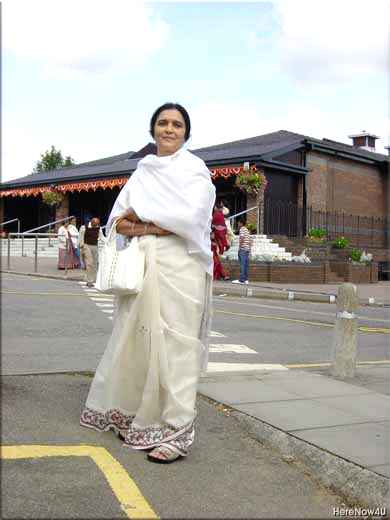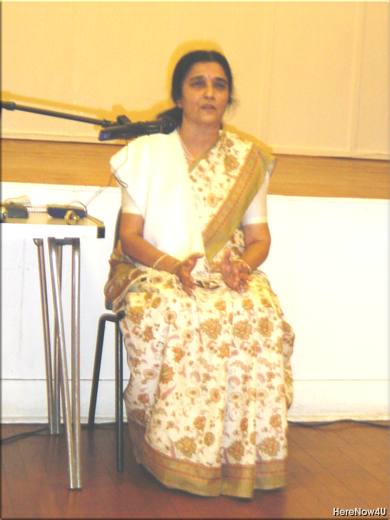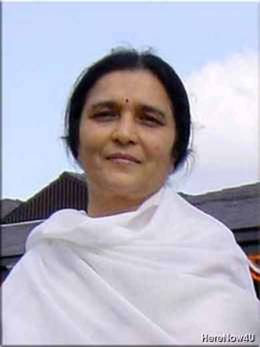
Pramoda Chitrabhanu,
"All of us have got one wing; we can fly into eternity embracing each other."
For Paryushan 2005, Pramoda Chitrabhanu gave a series of Paryushan lectures in London; all of them were in Gujarati. The only one in English language was delivered for Young Jains U.K., on 30th August at Navnat Bhawan.
It is most important to apply Jain teachings into day-to-day life. This means to practise self love without ego, to feel responsible for the education of the underpriviliged, to protect animals, and to be careful, as to give as little harm as possible to all kinds of living beings. Let us recite Namor Mahamantra as a sign that in our life we will aim at adjusting it according to the teachings of the enlightened souls. (Recitation follows.)

Man never has never been happy with his life, independantly from the circumstances he was living in. All living beings are seeking happiness and joy, all of them want to avoid misadventure. Mahavira has liberated himself from this; he was aware of the fact, even when winning the rat race, one still remains a rat. He has given up everything and chosen another kind of life for himself.
By always looking outward, we have departed from the centre; we live mostly with matter and have only little relation to spirituality. Although we are not perfect, we are expecting perfection from others.
From tomorrow on, the Jains are celebrating the festival of Paryushan. Let us have a closer look to the meaning of the word Paryushan, it is composed of two words: pari & ushan; pari means from all directions, ushan to stay closer to our Self. How can we stay closer to our Self? By fasting or other restraints we come closer to Atma and to what we really are. So Paryushan is the festival of the soul, of Atma; the essence of this festival is forgiveness. All spiritual practices are basing on forgiveness; forgiveness is divine. These 8 days out of 365 we are dedicating to the spirit.
Mahavira has given it to us as festival of renewal and introspection, to be close to Atma, to the soul. Atma is eternal, with infinite bliss, and with unlimited abilities. We can all realise what we want to reach, when we are gaining self confidence. Self confidence will increase by realising the importance of every particular moment of our life. Then we will be able to conquer hatred, aversion, and doubt.
Some lines from a book written by a prisoner in a concentration camp come into my mind, he wrote:
I believe in the sun, although I am not capable to see it;
I believe in love, although it does not reach me;
I believe in God, although he does not speak to me.

We have everything, however, we very often are only concentrated on the negative. Worthless worries are dominating human life. When we have all, what are we going to chose? Amity or enmity... The message of Paryushan is, to chose the best.
Jesus on the cross said, "Father, forgive them; they are not aware of what they are doing."
Forgiveness can cure resentment, hatred, enmity; they all are dissolved through forgiveness, and we are free. Whatever had been done to us, we are carrying with us wherever we go, up to the moment we forgive. As long as we do not grant forgiveness, we are prisoners of our negative drifts.
Abraham Lincoln had conquered his enemies by making them his friends. When Nelson Mandela was asked if he has no feelings of enmity against those who had put him in prison, he said "They have put me in prison for 27 years; now I am free. I don't want to continue my life in the prison of hate."
We all know that it is difficult to control negative feelings; but when we say we are not capable to master them, that is a lie. When we are talking to policemen or tax collectors, and they remind us that we had done something wrong, we respond politely, accept their critics, and even excuse for having been wrong. When someone of our family is doing the same, we get angry. We are kind to everyone and master ourselves, why not in front of our dear ones? We have to be attentive towards this kind of mental pollution; it is the most dangerous.
The theatre of violence is like throwing a spanner in the works of our brain. When we forgive, we are informing the other person that we are no longer angry with him, and we are liberating ourselves from destructing negative energies. We should always inquire if we are right, and if our actions are in concordance with Jain Dharma.
Once a teacher entered the classroom with a white ball; the ball had a tiny black bead. He asked his students, "What are you seeing?" The majority answered, "A black bead"; only one student saw the white ball... What are we seeing?
Watch your thoughts, they will become your words;
Watch your words, they will become your actions;
Watch your actions, they will become your habits;
Watch your habits, they will become your character;
Watch your character, it will become your destiny.
We are responsible for our own misery, not others. It is important to be noble, to have a big heart, and to forgive. Without forgiveness we are nourishing thorns in our hearts, that give great pain to us. Robert Browning put it this way, "The mission of life is releasing the splender within."
All of us have got one wing; we can fly into eternity embracing each other.
 Pramoda Chitrabhanu
Pramoda Chitrabhanu